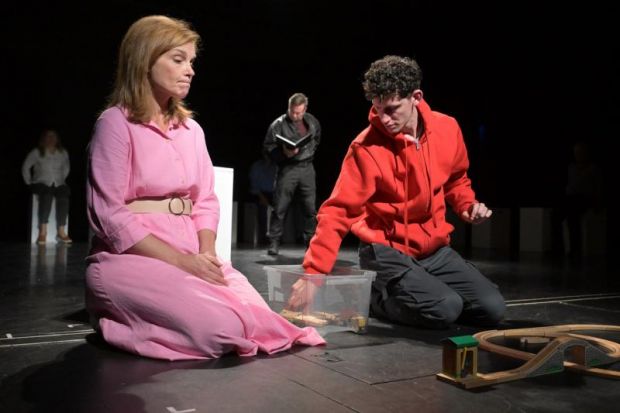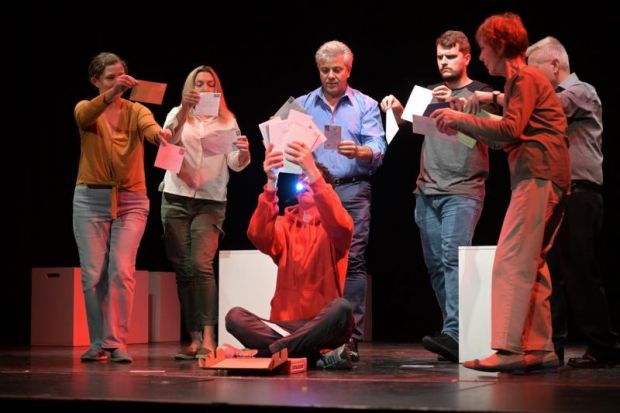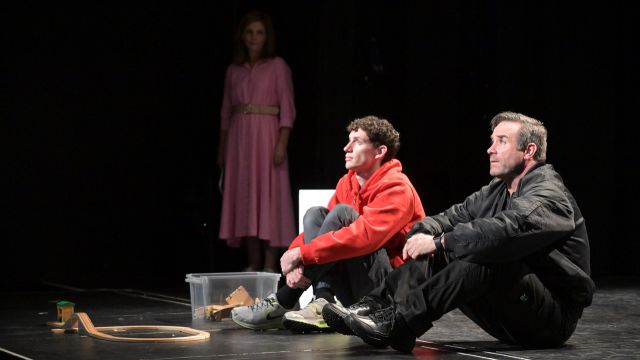The Curious Incident of the Dog in the Night-Time
Christopher Boone is fifteen years old, likes maths, outer space, looking after Toby, his rat, and he sees everything. In the multi-award-winning adaptation of Mark Haddon’s famous novel, Simon Stephens places an autistic boy in the midst of what he sees only as a murder mystery, but quickly reveals that despite knowing every colour of the cars he passed on his way to school, he is unaware of the neighbourhood secrets and the human capacity to lie and deceive.
The play opens with a garden fork, which is standing upright because it’s embedded in a dead dog. And once Christopher is cleared of his neighbour’s accusations that he committed the deed, he sets out to find out whodunnit.
The play premiered in the UK’s National Theatre in 2012, and hugely successful West End and Broadway seasons followed – before going on tour around the world, including to Australia in 2018. Those productions demonstrated beautiful and incredible movement created by the physical theatre geniuses Frantic Assembly, which saw Christopher flying through space and walking on walls; and extensive video projections that presented Christopher’s experiences to the walls and floor of the theatre. For a story about a boy that easily gets over-stimulated, there’s a lot going on in that production to take in.

It must have been daunting for a local theatre company to take on this project without the budget and facilities that a West End show can enjoy – and I admit to entering the auditorium a little scared of how the production would work without those expensive and extensive visual effects. Five minutes into the show, I had forgotten all those fears.
Through stripping away those visual distractions, however clever, director Nick Fagan brings focus to the narrative, in particular the growth that Christopher forces himself through, to banishing one fear at a time to overcome another.

Benji Riggs is Christopher. His mannerisms, the focus on himself, how you can see him operating on logic alone – and his loud and aggressive reaction to being touched – show a boy struggling in the world, and Riggs gives a performance where you don’t feel pity for his struggles, but euphoric when he overcomes them. Riggs’ distress when he realises he’s been lied to is heart-breaking, and his management of his manic moments through the reciting of prime numbers controls the pace of the audience’s experience too.
He is ably supported by the brilliant Michelle Nightingale, who plays his ever-patient teacher Siobhan. She sustains a gentle trust with Christopher, and Nightingale brings nuanced emotion through the ups and downs of his directness – even her soft Irish accent is calming.
Brendan Cooney is Ed, Christopher’s father, who is taking care of him after his mother never returned home. Cooney dials down his usual larger-than-life ruffian to be a hard-working man with anger issues (not unjustified), who’s just trying to do the right thing for his son – and his tenderness when calming Christopher is superb.

Nicole Rutty as Judy, Christopher’s mum, is also terrific: she shows guilt and love and frustration all at the same time, and her relating to her son is beautiful. The others work as an ensemble, taking multiple roles that pop in and out of the story, and they work really well together: Jean Walker’s Mrs. Alexander is a standout, but collectively, the six performers hold up the rest of the narrative, selflessly allowing the others to shine.
The Goodwood Theatre stage is empty save for fourteen white blocks, which serve as seats, ticket counters, and bedside tables, and the cast move them around the space. Suitably English props keep the story familiar in its origins of Swindon and London. There is sufficient width and depth to present multiple locations one after another, and the audience is ably guided by Richard Parkhill’s excellent lighting that serves to highlight the where and what.
The movement of Christopher amongst the city crowds isn’t entirely effective – it has moments of a ‘find your space’ rehearsal exercise, and the ensemble don’t always flow without distracting from Christopher - but these flaws are fleeting. and Fagan keeps the choreography and physical movement simple.

The starkness of the performance space gives breathing room for the story, and the audience is much closer – physically and emotionally – to the evolution of relationships between Christopher and those who care for and love him. What’s revealed in the absence of visual spectacle is how challenging and repetitious it is to parent a child who can’t reflect emotion in the same way; who can’t stand being held; and how fulfilling it is when people are simply kind to him, accepting of his methods, normalising his interests and actions. The cast and creatives of this production have developed something that rewards audiences, largely without sentimentality: humanity can choose to rise above the struggle and bring growth and hope.
Review by Mark Wickett
Photographer: Greg Adams
Subscribe to our E-Newsletter, buy our latest print edition or find a Performing Arts book at Book Nook.

